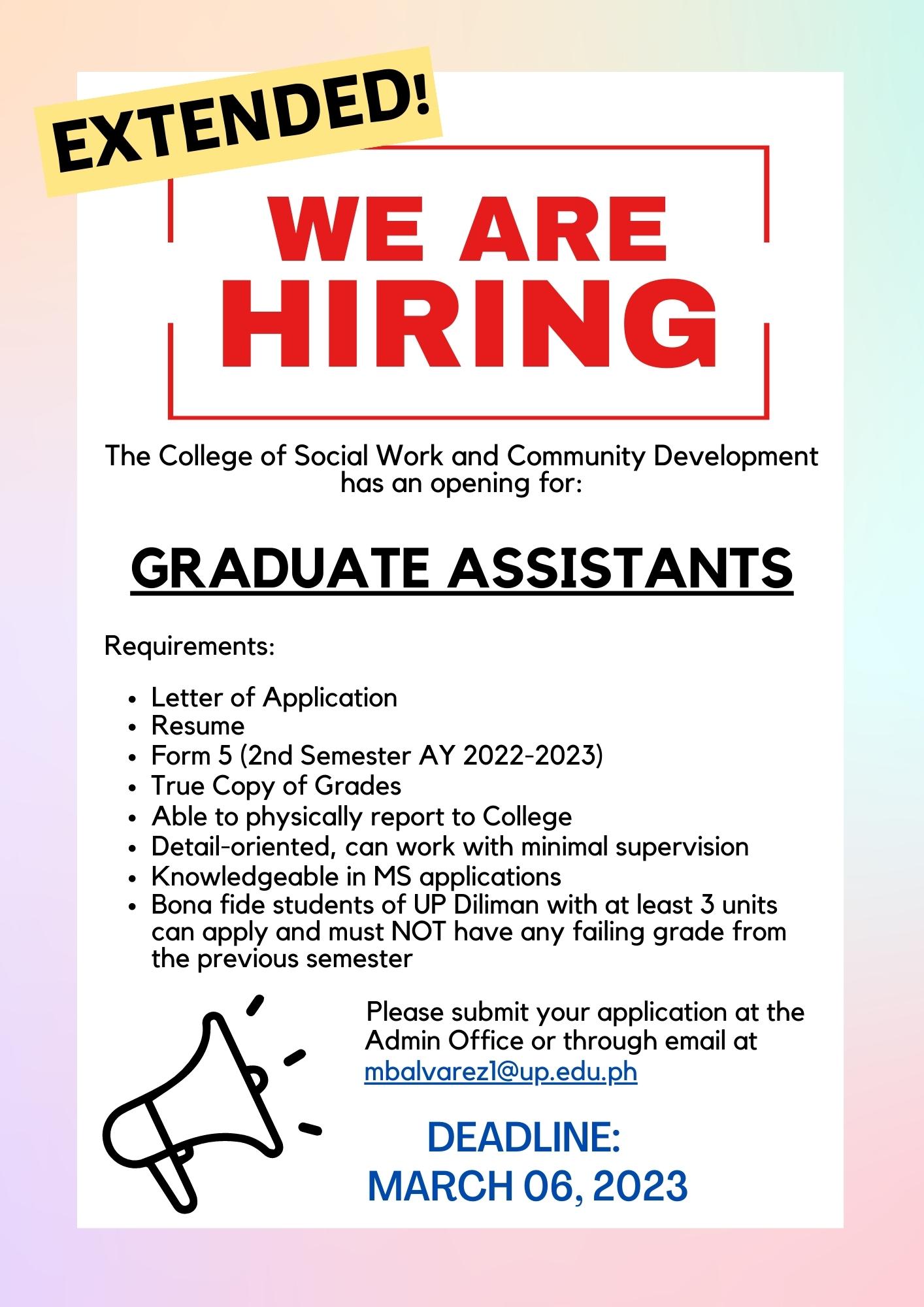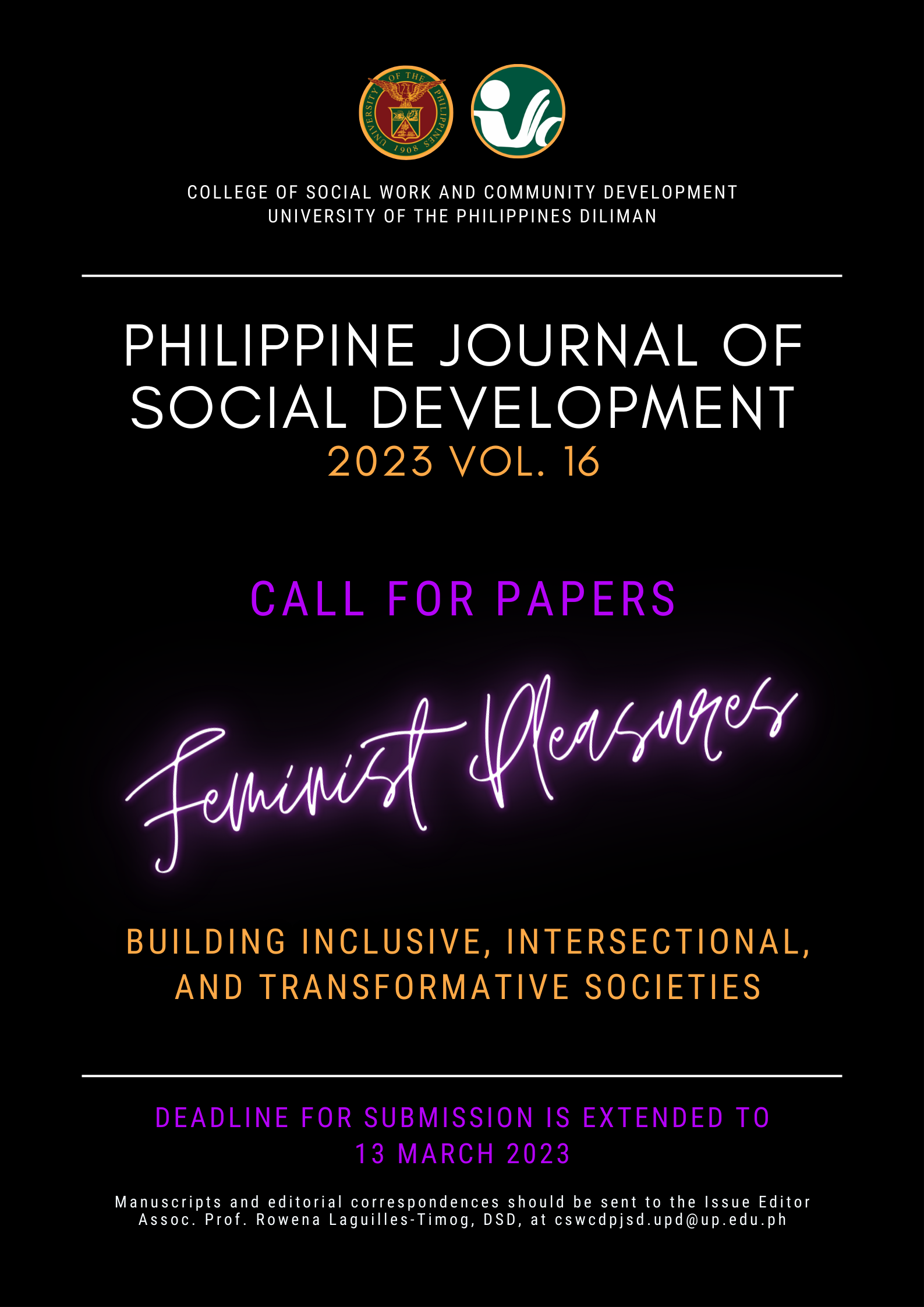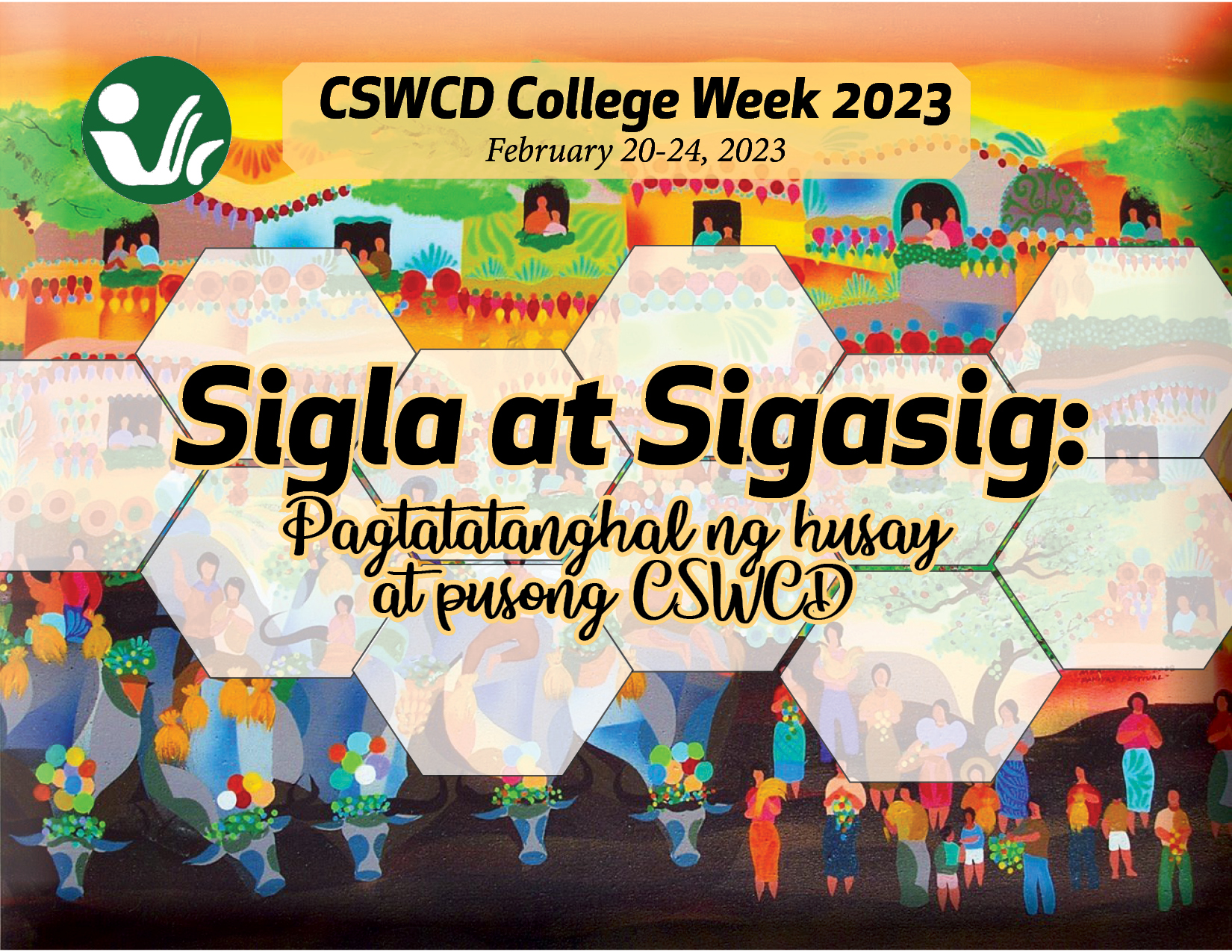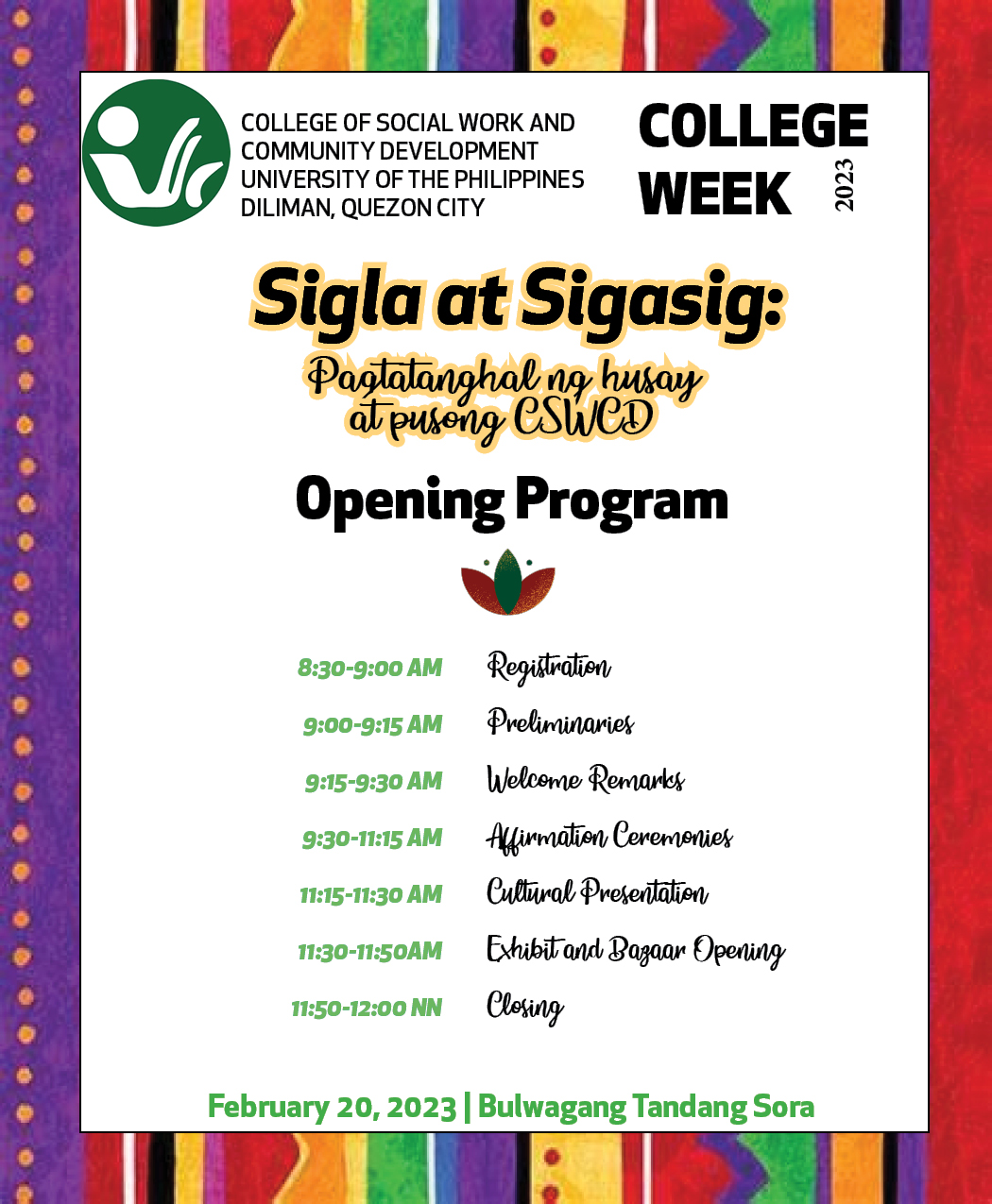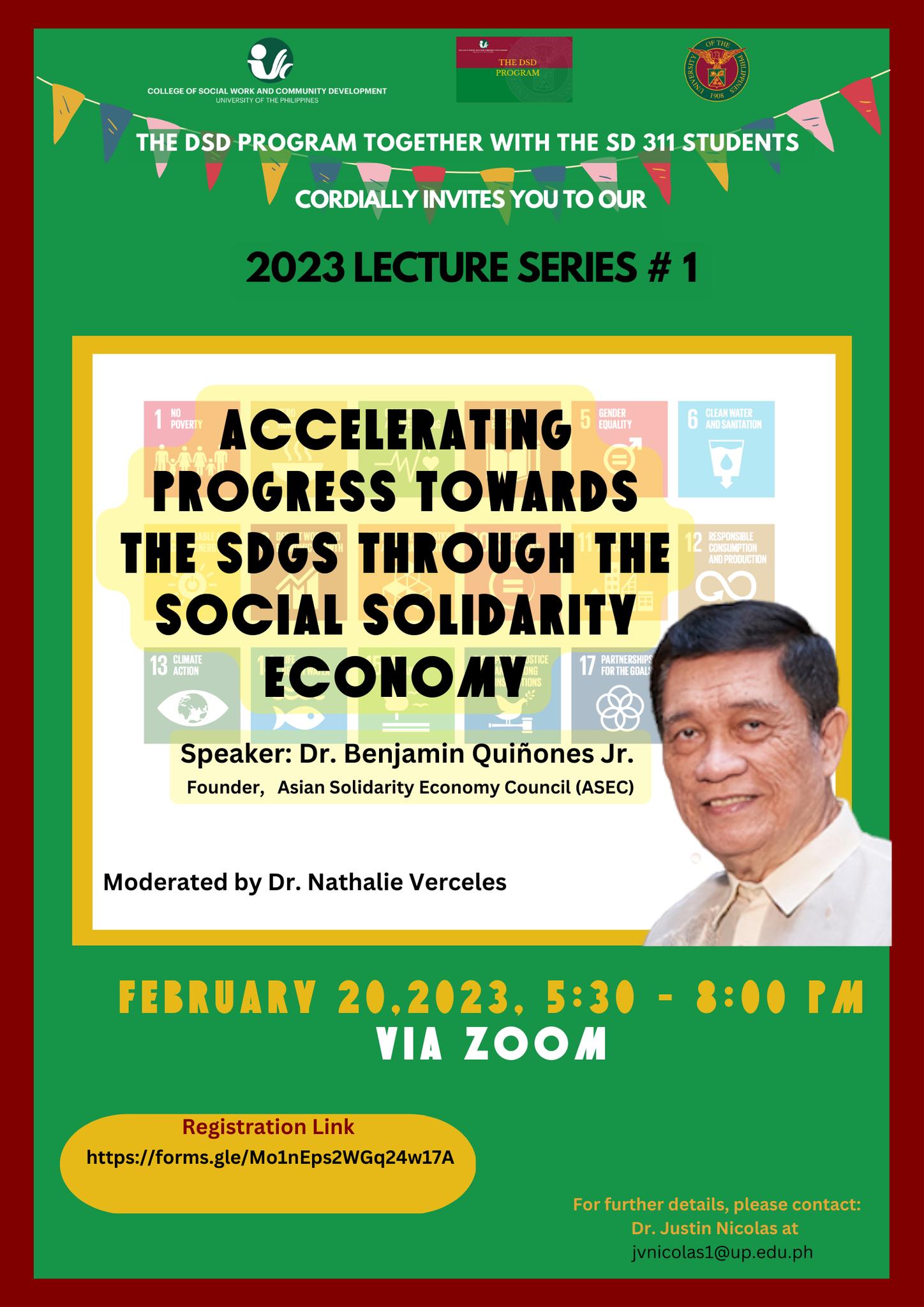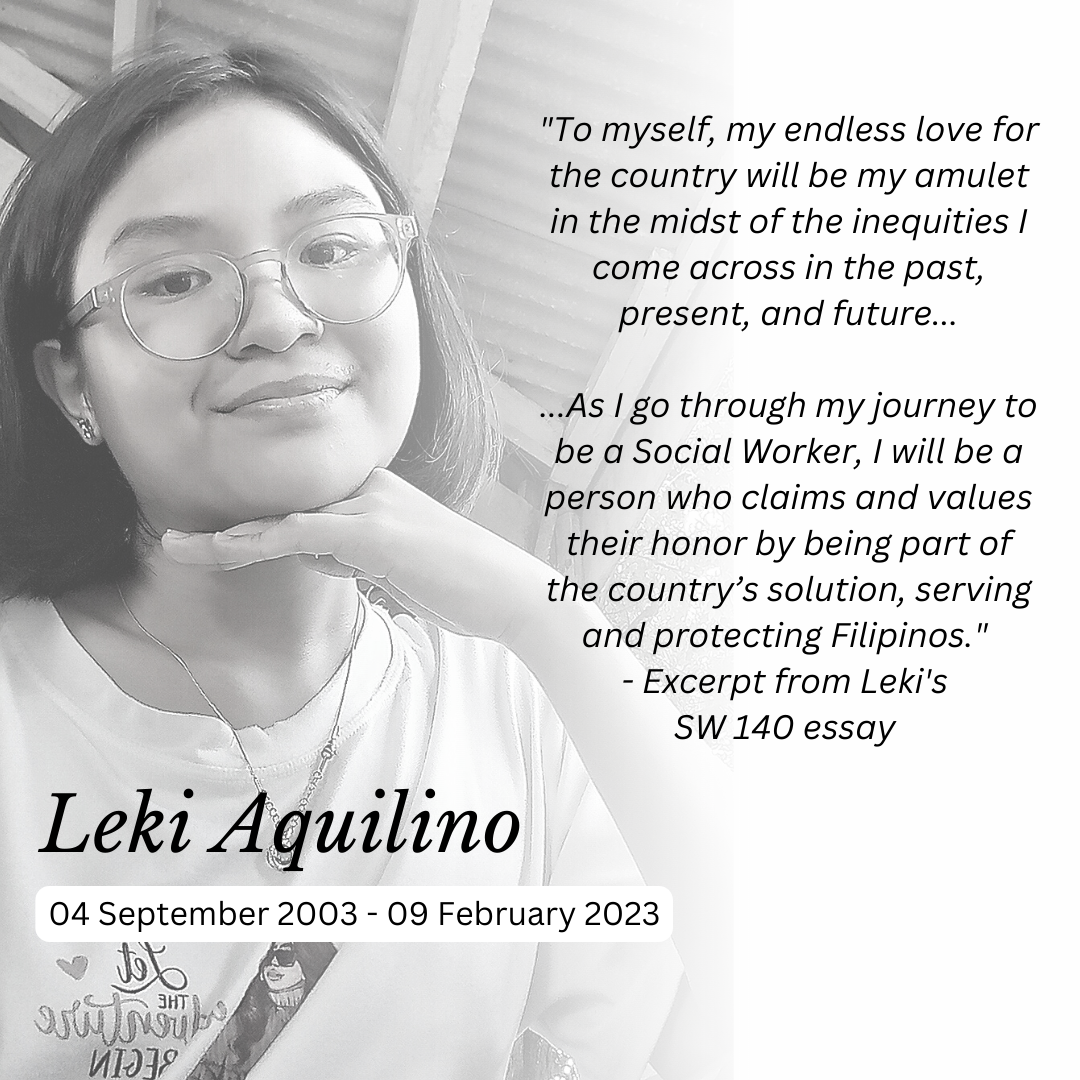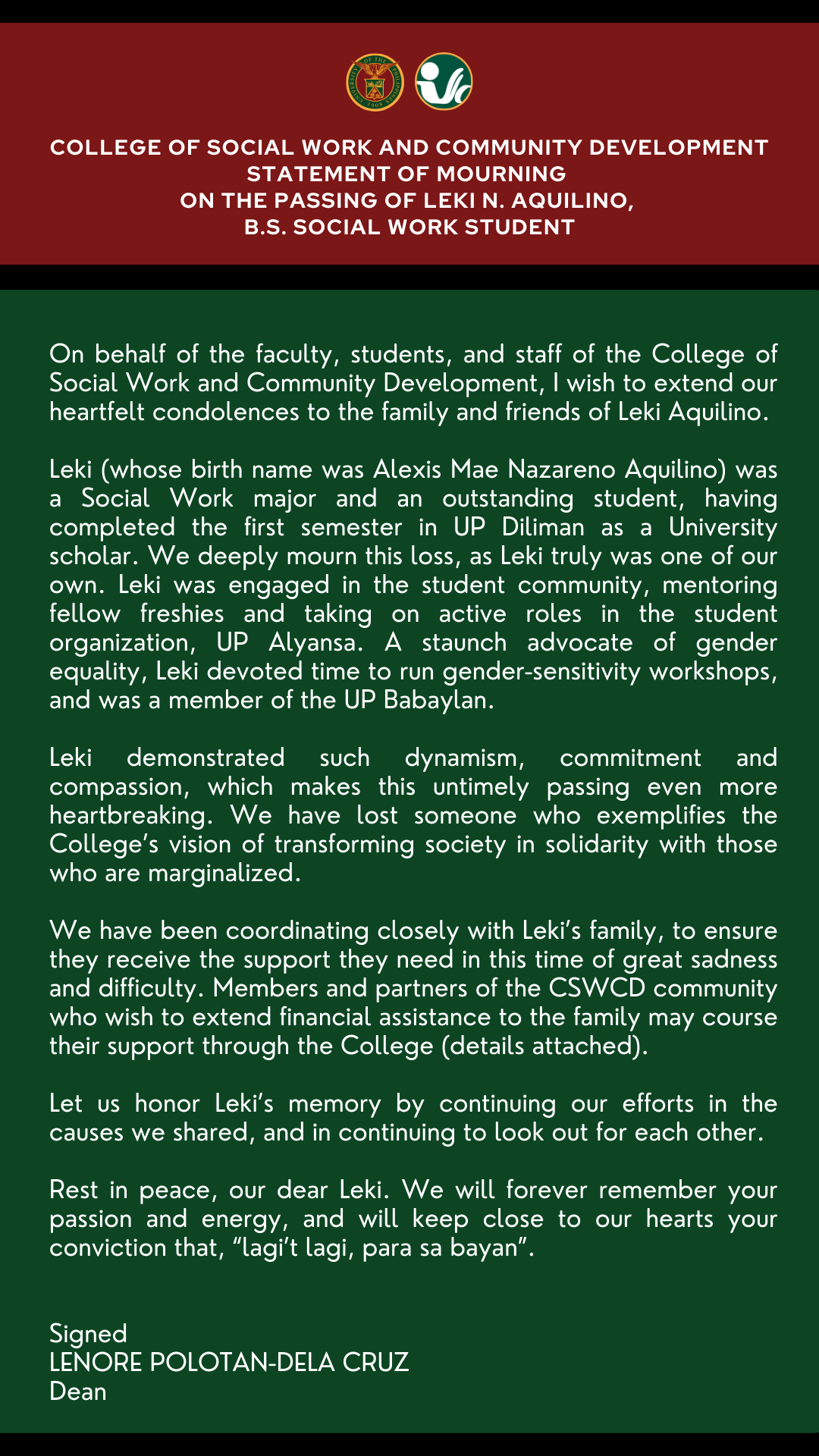

Author: CSWCD REDO
[CSWCD Update] CSWCD meets with DSWD (March 15, 2023)
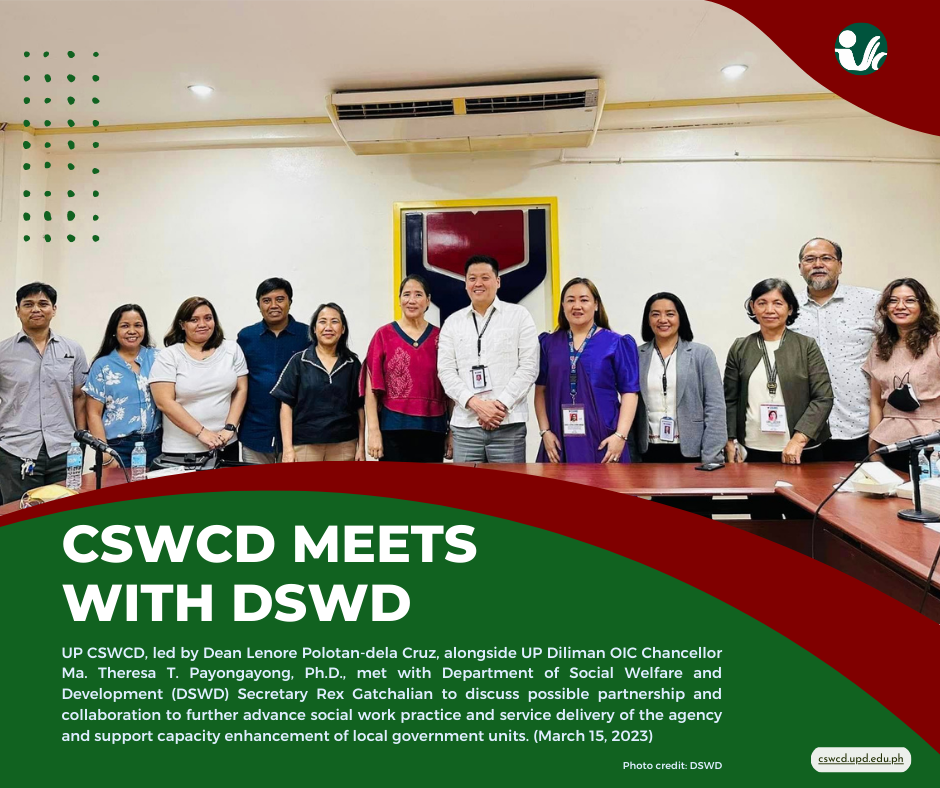 CSWCD meets DSWD
CSWCD meets DSWDDoctor of Social Development (DSD) Lecture series : Mining Technological Transition : Exploring Processes and Paths Toward Sustainable Development in Small-scale Mining Communities | March 22, 2023, 5:30pm
The UP College of Social Work and Community Development, in cooperation with SD 399 class, is inviting everyone to attend the Doctor of Social Development (DSD) Lecture series on 22 March 2023, 5:30-8:00 PM via zoom.
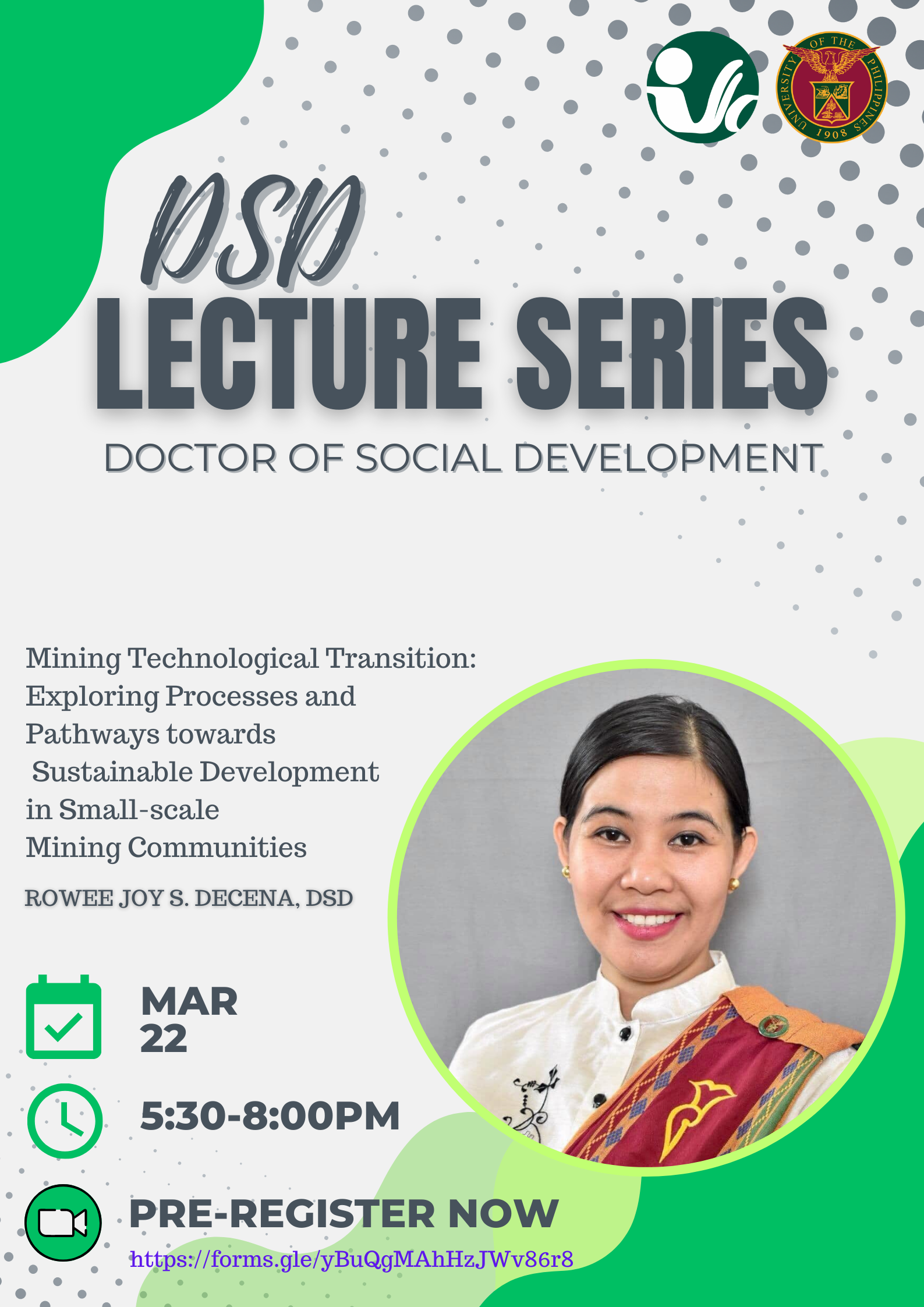
REDO Forum: Suara Babai: Remembering Jabidah Massacre, 18 March 2023
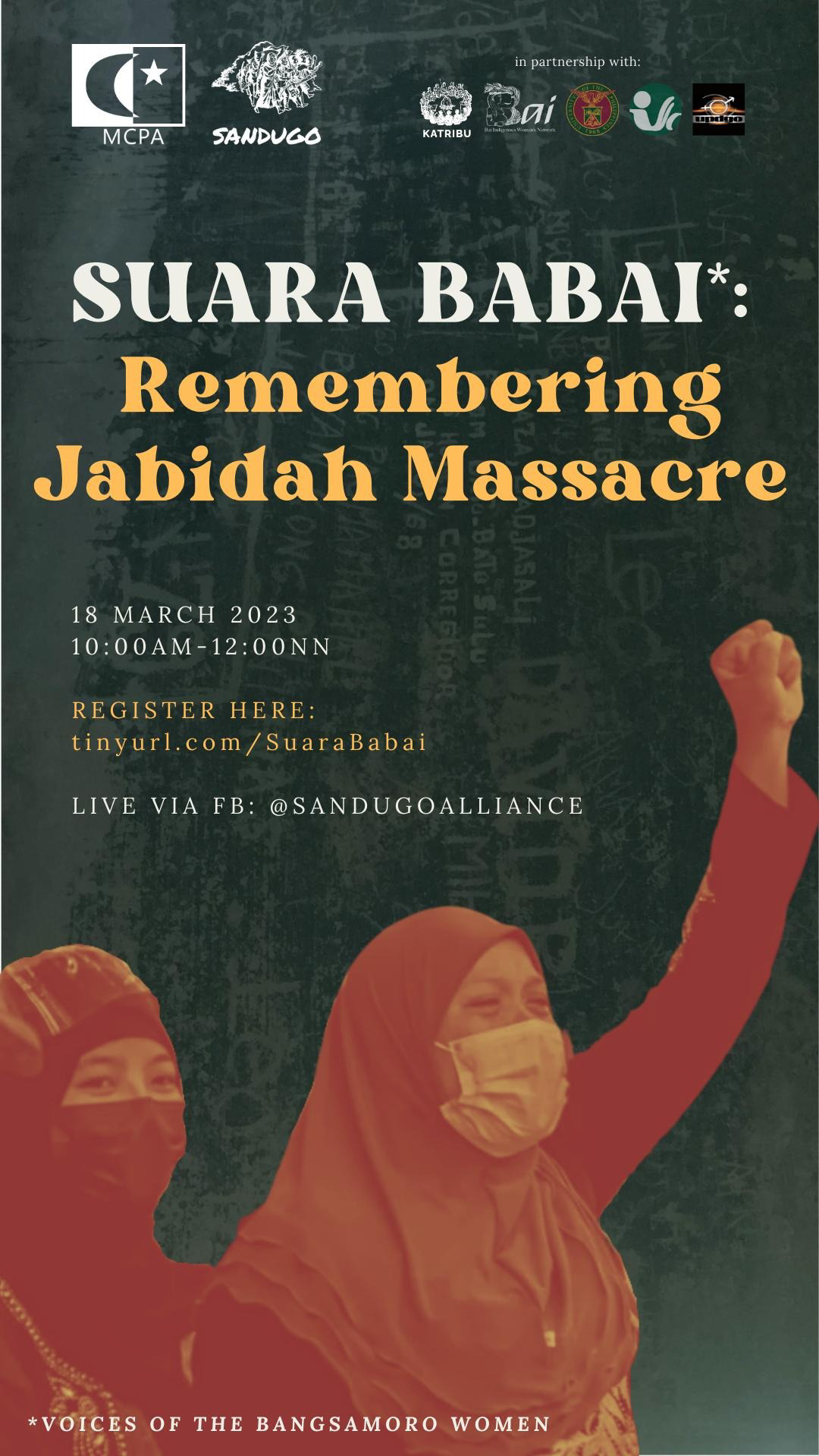
Suara Babai:
Remembering Jabidah Massacre and the stories and wisdom of Bangsamoro women
in the struggle for liberation and right to self-determination
18 March 2023 | 10AM
March 18 is a heroic date for the Bangsamoro people. It is the day for the commemoration of the Jabidah Massacre, the execution 55 years ago of a number of Moro youth who were commissioned for a military covert operation (Operation Merdeka) to take over the island of Sabah in Malaysia.
It is also the celebration of the Bangsamoro Freedom Day, the recognition that Jabidah massacre sparked the consciousness of the Bangsamoro people to pursue the struggle for self-determination and formed a liberation movement for secession.
The Jabidah Massacre is a reminder of the historical atrocities of the Philippine government in general, and former Philippine President Ferdinand Marcos Sr. in particular, to the Bangsamoro people. This was followed by the Manili massacre in 1971 where 70 people were killed inside their mosque in Carmen, North Cotabato.
Other massacres happened during Martial Law period that claimed more than 200,000 lives, ravaged Moro communities and caused the displacement and migration of half a million Bangsamoro people to other provinces in the country and to Sabah, Malaysia. To this day, the Bangsamoro people are still waiting for the recognition, justice and restitution for the victims.
Worse, there is a growing movement under the Marcos Jr. administration that seeks to revise, to the point of deny, the atrocities committed by Marcos Sr. before and during Martial Law.
In these narratives, little is known about the roles that Bangsamoro women played in the history of the Bangsamoro struggle. Bangsamoro women are always portrayed as the victims, helpless and vulnerable. The accounts of how Bangsamoro women fought alongside Bangsamoro men in the fight to defend their communities are frequently left out by storytellers and movement leaders.
Hence, there is a need to highlight the stories of the roles that the Bangsamoro women played in the Bangsamoro struggle and their contribution to the Filipino peoples struggle in general. There is also a need to highlight the situation and concerns of the displaced Bangsamoro women in Metro Manila who were forced to evacuate from their communities in Mindanao due to conflict.
In line with this, the Research and Extension for Development Office of the College of Social Work and Community Development will hold a forum and consultation, “Suara Babai: Remembering Jabidah Massacre and the stories and wisdom of Bangsamoro women in the struggle for liberation and right to self-determination” on March 18, 2023 from 10:00am to 3:00pm.This forum and consultation aims to encourage Bangsamoro women to speak out and identify their actual and perceived role(s) and contribution(s) to the struggle for liberation and self-determination. It also hopes to document these stories and promote them publicly as part of our commitment to help empower the Bangsamoro women.
This forum is part of our contribution to the month-long celebration of the recognition of women’s rights and struggle.
Statement of the Social Work Action Network Philippines: “ASA KA PA? and the BUFFER ZONE”
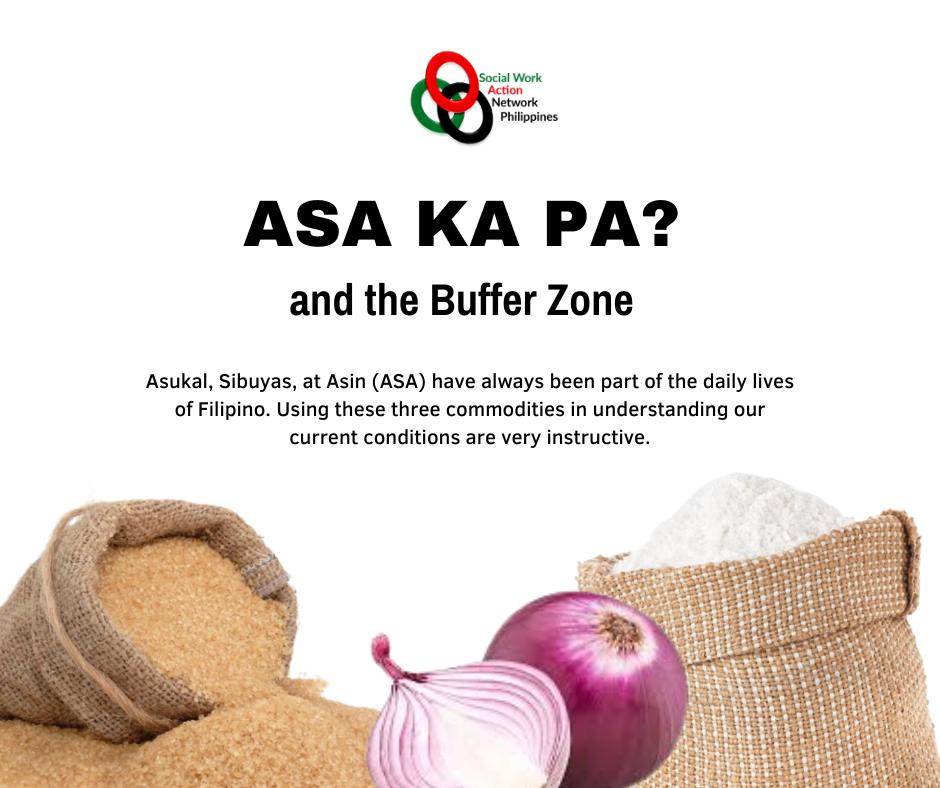
ASA KA PA? and the BUFFER ZONE
Asukal, Sibuyas, at Asin (ASA) have always been part of the daily lives of Filipinos. Using these three commodities in understanding our current conditions are very instructive.
Last week, the Sugar Regulatory Commission has proposed to import 450,000 metric tons (MT) of sugar this year following the instruction of President Marcos to bring down retail prices of the sweetener (Rivera, 2023). The proposed volume will cover a two-month buffer stock of sugar at the end of the milling season (Rivera, 2023). Last year’s plan to import 200,000 tons of sugar will make life less sweeter to some 66,000 sugar workers who will be directly displaced from their jobs and about 500,000 who derive indirect employment. If each worker has family of five the life would be less sweeter for about 3 million Filipinos (Mendoza, 2022).
Onions and salt have always been part of the meals of the Filipinos, “a staple in Filipino cuisine.” For culinary enthusiasts, both can make or break a dish. Last January 10, 2023, the president approved the importation of 21,060 MT and expected to arrive later this month or the first week of February, 2023 (CNN, 2023). This planned importation “to soothe a brutally high inflation and growing consumer woes could end up hurting onion farmers in the country (Royandoyan, 2023).
Onion farmers have been driven to despair, with some taking their own lives, after bearing the brunt of protracted losses, mounting debts, unscrupulous traders who have made their crops out of consumers’ reach, and the deluge of smuggled onions in the market (Lagare et. al., 2023).
The onion has become symbol of inflation (Palatino, 2023). Funny memes depicting onion as a luxury gift and symbol of affluence were widely shared on social media. The humor hides the suffering of poor families who are barely surviving amid the rising prices of basic goods and the absence of a substantial wage hike (Palatino, 2023).
We imported 628,500 MT or equivalent to 92 percent of the country’s salt requirements in 2019 and 2020, since local production was unable to meet demand (CNN Philippines Staff, 2022). According to an expert, the country has only 2,000 hectares remaining salt farm beds. This is very ironic since the Philippines is an archipelagic country.
As we all know, the structural driver for these phenomena is no other than the neoliberal ‘development’ paradigm that has been fully implemented since the 1970s. Consequently, heavy dependence on importations breeds cartels and syndicates that hoard the imported commodities, created artificial shortage of supply and raised prices. This is, of course is not possible without the connivance of well-positioned government officials.
The anti-Filipino character of this ‘development’ paradigm is exacerbated the extreme callousness of the current regime to the plight of the people. Earlier in August, 2022, Diokno said that “the giving out of ayuda in relation to the pandemic is already a waste of public funds.” According to Sonny Africa, Executive Director of IBON, “the high of PhP 233.7 billion worth of cash support in 2020 fell to PhP 9.5 billion in 2022and is down to a trifling PhP 10.5 million this year…. Regular emergency assistance programs have also been cut and are down from PhP 97.4 billion in 2022 to PhP 90 billion this year or a PhP 7.5 billion budget cut. This included billions slashed from the budgets for families in difficult circumstances (Department of Social Welfare and Development), displaced workers (Department of Labor and Employment), and overseas workers (Overseas Workers Welfare Administration. The Marcos Jr administration even cut the budgets of the Pantawid Pamilyang Pilipino Program (4PS) by PhP 5.1 billion and of the KALAHI_CIDSS community development program by PhP 2.8 billion.”
These facts are either deliberately hidden from the public coupled if not for the advocates and people’s organizations that expose them. There is also the barrage of the disinformation about the GDP growth redounding to the interests of the people. But the more insidious tactic is churning of lies that the government still care for the people. This is the buffer zone.
We social workers have been charged together with other disciplines and professions as part of the buffer zone. For Paul Kivel, “people in the ruling class have always wanted to prevent people at the bottom of the pyramid from organizing for power in order to maintain the power, control, and, most importantly, wealth that they have accumulated. At the same time, they have generally wanted to avoid directly managing people on the bottom of the pyramid. To maintain this separation and to prevent themselves from becoming the objects of people’s anger, they have used legal, educational, and professional systems to create a network of occupations, careers, and professions to deal directly with the rest of the population. This buffer zone comprises all occupations that carry out the agenda of the ruling class without requiring ruling class presence or visibility.”
Under this current ‘dark time”, the unmasking of the buffer zone is propelled by the sharpening of the contradiction between those who professed to govern and those at the bottom. But the complete unmasking and bursting of the buffer zone does not come naturally. Repression does not automatically lead to resistance. The pricking and the elimination of the buffer zone starts with the raising of our political consciousness and together with the people understand our current dark period, deepen our commitment, and eventually taking the resolve to act collectively.
One of these is exposing and condemning the mainstream social work practice as part of the buffer zone that has long time ago lost its relevance.
The need for transformative social work has long been warranted. Let us help each other to realize it.
Another Social Work is Possible!
______________
CNN Philippines Staff (2022). 96% pf PH salt might be imported by 2030, group warns. https://www.cnnphilippines.com/…/PhilASIN-salt-import…
CNN Philippines Staff (2023). PH to import 21,060 MT of onions, fewer than earlier eyed. https://www.cnnphilippines.com/…/PH-to-import-21-060…
Lagare, J.B., Ramos, M., & Gascon, M. (2023). Loses driving onion farmers to desperation.
https://newsinfo.inquirer.net/…/losses-driving-onion…
Mendoza, T. (2022). Importing 200,000 tons of sugar: Making life bitter for 3M Filipinos. https://opinion.inquirer.net/…/importing-200000-tons-of…
Palatino, M. (2023). How the Onion Became the Symbol of Inflation in the Philippines. https://thediplomat.com/…/how-the-onion-became-the…/
Rivera, D. (2023). 450,000 MT of sugar eyed for importation. https://www.philstar.com/…/450000-mt-sugar-eyed…
Royandoyan, R. (2023). Import plan to hurt local onion farmers-analyst.
https://www.philstar.com/…/import-plan-hurt-local-onion…
SOCIAL WORK ACTION NETWORK – PHILIPPINES
January 30, 2023

![[CSWCD Update] REDO hosts forum on Bangsamoro Women and their struggle for self-determination](https://cswcd.upd.edu.ph/wp-content/uploads/2023/03/Suara-Babai-Forum-Update.png)
